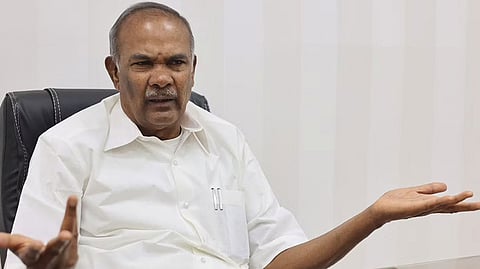

CHENNAI: Tamil Nadu Assembly Speaker M Appavu on Thursday said that the letter received from deputy Leader of Opposition O Panneerselvam regarding recent developments in the AIADMK was under consideration.
Talking to media persons at the Assembly Secretariat this morning, Appavu said, “Received a letter from the deputy leader of opposition through his secretary. Action taken will be in a democratic manner without prejudice.”
Asked about a decision on the letter, the Speaker added, “It is under consideration. No decision has been made so far.” On the AIADMK writing to the ECI (Election Commission of India) on the issue, he said, “I saw it on television. It is their party issue. It is not under our control. It is in the purview of ECI and their decision will be final.”
When reporters drew his attention to a “vague” RTI reply from the Raj Bhavan regarding the status of the NEET exemption Bill, Appavu said, “The re-adopted NEET Bill has not been approved so far. I have come across media reports suggesting that a reply from Raj Bhavan on the issue was not proper. We learned that the Bill has been forwarded (to the President). I do not know if it has reached or not.”
Reacting to a specific query on the Chief Minister’s earlier statement in the House that the governor has forwarded the Bill for the President’s assent, he said, “We believe that the bill would have been forwarded as was informed in the House by the CM. They (Raj Bhavan) might not have answered it to maintain secrecy. I did not see the RTI reply. I do not know its details.”
On the pendency of many bills at Raj Bhavan, the Speaker said that as per the Assembly tradition, the Governor should either give his assent to Bills passed unanimously or with majority support of the House or forward it to the Centre as soon as possible. In some countries, when the governor does not give approval in 15 days or one month to a Bill passed by the House, it is deemed as approved and legislated.
Remarking that if such a tradition had existed here, the state would have obtained consent for the Bills, the Speaker said, “A house of representatives elected by the people has full authority. If a governor fails to give assent to bills passed by the House or fails to take follow up action on the Bill, it amounts to ignoring the people. The insult is to the people, more than the House.” “His (Governor) only duty is to give assent or forward it to a superior authority. That is the rule of the House. A month ago, the Assembly secretary sent an English copy of the Assembly rules to Raj Bhavan on request. I hope they will read it and act in accordance with the rules,” Appavu added.
Visit news.dtnext.in to explore our interactive epaper!
Download the DT Next app for more exciting features!
Click here for iOS
Click here for Android